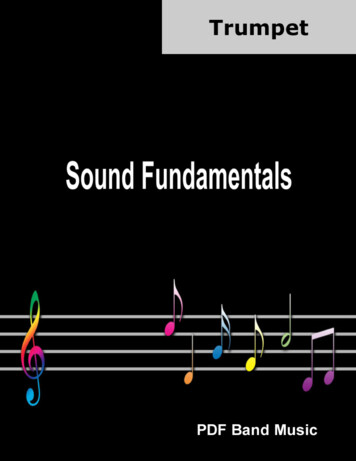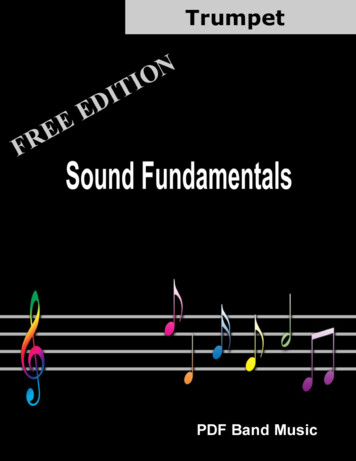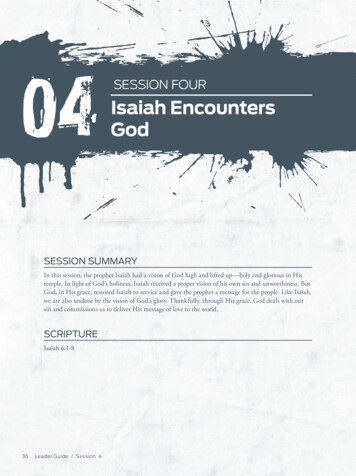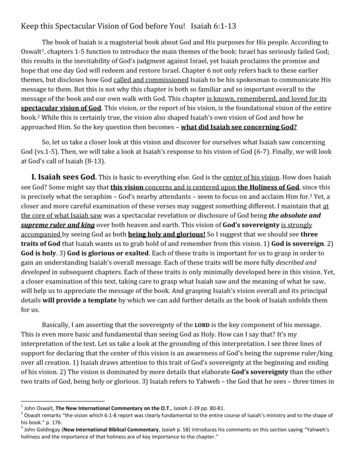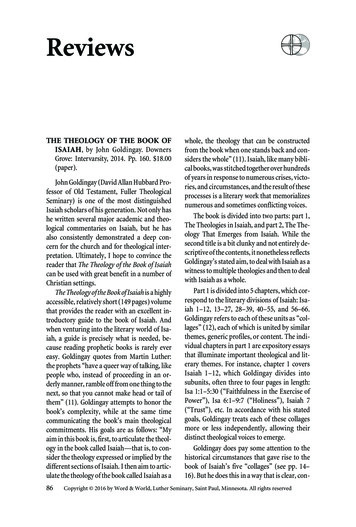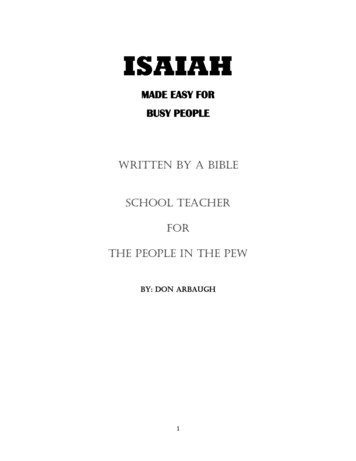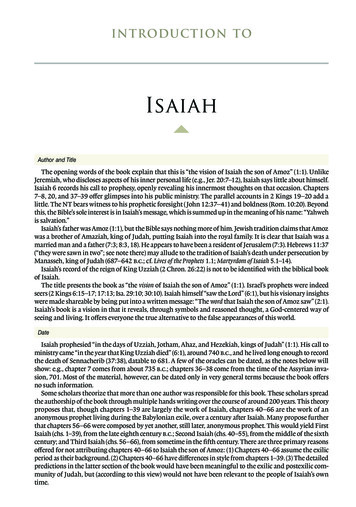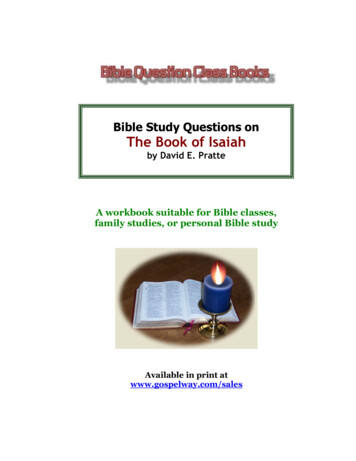
Transcription
Bible Study Questions onThe Book of Isaiahby David E. PratteA workbook suitable for Bible classes,family studies, or personal Bible studyAvailable in print atwww.gospelway.com/sales
Bible Study Questions on the Book of Isaiah:A workbook suitable for Bible classes, family studies,or personal Bible study Copyright David E. Pratte, 2013, 2014All rights reservedISBN-13: 978-1499794298ISBN-10: 1499794290Printed books, booklets, and tracts available atwww.gospelway.com/salesFree Bible study articles online atwww.gospelway.comFree Bible courses online atwww.biblestudylessons.comFree class books atwww.biblestudylessons.com/classbooksFree commentaries on Bible books atwww.gospelway.com/commentaryContact the author atwww.gospelway.com/commentsNote carefully: No teaching in any of our materials is intended or should ever beconstrued to justify or to in any way incite or encourage personal vengeance orphysical violence against any person.“He who glories, let him glory in the Lord”– 1 Corinthians 1:31Front Page PhotoSennacherib Prism (housed in Oriental Institute) – A record of the annals ofSennacharib, king of Assyria, including his siege of Jerusalem under Hezekiah.The translation of the prism says: “As for Hezekiah, the Judean, who did notsubmit to my yoke, 46 of his strong, fortified cities, as well as small cities in theirvicinity without number - I beseiged and captured . Himself, like a caged bird Ishut up in Jerusalem, his royal city . and he sent rich tribute to me in Nineveh.”(Note that he did not claim to have captured Jerusalem.)However, the Bible account records: “Then the angel of the Lord went out, andkilled in the camp of the Assyrians one hundred and eighty-five thousand SoSennacherib king of Assyria departed and went away, returned home andremained at Nineveh.” –Isaiah 37:36,37Workbook on IsaiahPage #2
Other Books by the AuthorTopical Bible StudiesGrowing a Godly Marriage & Raising Godly ChildrenWhy Believe in God, Jesus, and the Bible? (evidences)The God of the Bible (study of the Father, Son, and Holy Spirit)Grace, Faith, and Obedience: The Gospel or Calvinism?Kingdom of Christ: Future Millennium or Present Spiritual Reign?Do Not Sin Against the Child: Abortion, Unborn Life, & the BibleTrue Words of God: Bible Inspiration and PreservationCommentaries on Bible BooksGenesisJoshua and RuthJudges1 SamuelEzra, Nehemiah, and EstherJobProverbsGospel of MarkGospel of JohnActsRomansEphesiansPhilippians and ColossiansHebrews1 & 2 PeterBible Question Class BooksGenesisJoshua and RuthJudges1 SamuelEzra, Nehemiah, and EstherJobProverbsEcclesiastesIsaiahGospel of MatthewGospel of MarkGospel of LukeGospel of JohnActsRomans1 Corinthians2 Corinthians and GalatiansEphesians and PhilippiansColossians, 1&2 Thessalonians1 & 2 Timothy, Titus, PhilemonHebrewsGeneral Epistles (James - Jude)RevelationWorkbooks with Study NotesJesus Is Lord: Workbook on the Fundamentals of the Gospel of ChristFollowing Jesus: Workbook on DiscipleshipGod’s Eternal Purpose in Christ: Workbook on the Theme of the BibleVisit our website at www.gospelway.com/sales to see a current listof books in print.Page #3Workbook on Isaiah
Bible Study Questions on the Book of IsaiahIntroduction:This workbook was designed for Bible class study, family study, or personal study. The classbook is suitable for teens and up. The questions contain minimal human commentary, but insteadurge students to study to understand Scripture.Enough questions are included for teachers to assign as many questions as they want for eachstudy session. Studies may proceed at whatever speed and depth will best accomplish the needsof the students.Questions labeled "think" are intended to encourage students to apply what they have learned.When questions refer to a map, students should consult maps in a Bible dictionary or similarreference work or in the back of their Bibles. (Note: My abbreviation "b/c/v" means "book,chapter, and verse.")For class instruction, I urge teachers to assign the questions as homework so students cometo class prepared. Then let class time consist of discussion that focuses on the Scripturesthemselves. Let the teacher use other Scriptures, questions, applications, and comments topromote productive discussion, not just reading the questions to see whether they were answered“correctly.” Please, do not let the class period consist primarily of the following: "Joe, will youanswer number 1?” “Sue, what about number 2?" Etc.I also urge students to emphasize the Bible teaching. Please, do not become bogged downover "What did the author mean by question #5?" My meaning is relatively unimportant. The issueis what the Bible says. Concentrate on the meaning and applications of Scripture. If a questionhelps promote Bible understanding, stay with it. If it becomes unproductive, move on.The questions are not intended just to help students understand the Scriptures. They are alsodesigned to help students learn good principles of Bible study. Good Bible study requires definingthe meaning of keywords, studying parallel passages, explaining the meaning of the text clearly,making applications, and defending the truth as well as exposing religious error. I have includedquestions to encourage students to practice all these study principles.Finally, I encourage plain applications of the principles studied. God's word is written so soulsmay please God and have eternal life. Please study it with the respect and devotion it deserves!For whatever good this material achieves, to God be the glory.You can find Bible study commentary and notes to accompany many of ourworkbooks at www.gospelway.com/sales David E. Pratte, June 21, 2017Workbooks, commentaries, and topical studies for sale in print atwww.gospelway.com/salesTo join our mailing list to be informed of new books or special sales, contact theauthor at www.gospelway.com/commentsWorkbook on IsaiahPage #4
Assignments on Isaiah chap. 1Please read Isaiah 1:1,2 and answer the following questions:1. When did Isaiah prophesy – 1:1? To or about whom primarily did he prophesy?2. See if you can find the meaning of the name “Isaiah.”3. What do we know about Isaiah’s parents?4. What do we know about Isaiah’s children (see 7:3; 8:3)?5. Case Study: Some modernist thinkers deny that Isaiah is the author of this book (mainlybecause they are unwilling to accept that the predictions in the book could have been known aheadof time). List other passages where the book claims to be written by Isaiah.6. List several places where the New Testament says Isaiah wrote teachings in this book.7. For each of the kings named in v1, list another passage that discusses him and name at leastone thing we know about him.* Uzziah -* Jotham -* Ahaz -* Hezekiah -Page #5Workbook on Isaiah
8. As you study the kings named in 1:1, see if you can determine what kings reigned in thenorthern kingdom of Israel during this time.9. Define “vision” (v1).10. List any other helpful information you can find by way of introduction to the book (suchas contemporary prophets, the theme of the book, historical background, etc.).11. How did God describe His people in 1:2-4? To what did He compare them? Explain.12. How did God illustrate the people in 1:5,6?13. What were the consequences of the people’s sins (vv 7,8)? Explain the illustration of thebooth and the hut.14. To what cities did God compare them (v9)? What is the lesson?15. Define “remnant.” In what sense was there a remnant among God’s people?Workbook on IsaiahPage #6
16. What specifically did God criticize – 1:10-12? To what did He object in 1:13-15?17. Application: Did God not instruct them to give sacrifices and observe holy days? Whatwas the problem, and what was the solution – 1:16,17)? What should we learn?18. What hope did God offer them (v18)? What is required for sinners to receive this blessing(note vv 16-18)?19. What consequences would follow from the people’s choice (vv 19,20)?20. Had the city always been wicked? What change had occurred (vv 21-23)?21. How did God intend to deal with the people (vv 24-28)?22. What illustration did God use to describe the end result (vv 29-31)?23. Application: What lessons can we learn for our nation and ourselves today?Page #7Workbook on Isaiah
Assignments on Isaiah chap. 2Please read Isaiah 2 and answer the following questions:1. Discuss the meaning of the following phrases from 2:1-4 (Note the Scriptures.)“latter days” – Acts 2:16,17; Hebrews 1:2 –“Lord’s house” - 1 Timothy 3:15; 1 Peter 2:5 –“all nations” flowing into God’s house – Matthew 28:19; Acts 2:5; Ephesians 2:11-19 –Law/God’s word going out of Zion/Jerusalem – Luke 24:44-49; Acts 1:4,5,8; 2:4,5,14 –people not learning war but peace - Ephesians 2:11-19; John 14:272. Why had God forsaken His people – vv 5,6?3. List other passages about soothsayers and eastern ways.4. What other sins had the people committed – vv 7-9?5. What would happen to those who were haughty and exalted – vv 10-17? List comparisonsin these verses that illustrate the point.6. Who will be exalted in that day? (Think: Note the expression “day of the Lord” and observehow it is used throughout Isaiah and elsewhere. What is the significance?)7. What would happen to idols when God brings down the haughty – vv 18-21?8. What should people do regarding those who exalt themselves and worship idols – v22?Why?Workbook on IsaiahPage #8
Assignments on Isaiah chap. 3Please read Isaiah 3 and answer the following questions:1. Because of the people’s sins, what would God take away – 3:1-3? Explain.2. What would God give to replace what He took– vv 4,5? How would people then act?3. What would happen when the people would seek other rulers – vv 6,7? (Think: What doesthis tell you?)4. Describe the conditions that brought these consequences on the people – vv 8,9.5. How are the fruits of righteousness contrasted to the fruits of wickedness in vv 10,11?Explain how this is true.6. What criticism did God have of rulers – 3:12-15? Why would this be offensive?7. How are the women described – v16? Define “wanton.” What is the point?8. What will God do to the women – vv 17-23? What lesson should be learned?9. What would God give instead of the finery the women had enjoyed – v24?10. Special Assignment: What New Testament passages teach similar lessons regardingthe conduct and appearance of women?11. What suffering would come upon the men of the nation – vv 25,26?Page #9Workbook on Isaiah
Assignments on Isaiah chap. 4Please read Isaiah 4 and answer the following questions:1. To what extremes would women go to find a husband – 4:1?2. Special Assignment: What does this teach about the natural order of marriage? Whatapplications can be made to the Feminist movement?3. List and study other passages about the “Branch of the Lord” – 4:2. What is thesignificance?4. How is the Branch described, and how are those who remain in Jerusalem described –4:2,3?5. What would God do for Jerusalem – 4:4?6. How would God bless their dwellings – 4:5,6? What is the significance in the Old Testamentof a cloud by day and fire by night?Workbook on IsaiahPage #10
Assignments on Isaiah chap. 5Please read Isaiah 5 and answer the following questions:1. What illustration did God use to show His relationship to the people – 5:1,2? Where elseare similar illustrations used in Scripture?2. What did the owner do to provide for the vineyard?3. How did the vineyard respond to the owner’s care?4. What would God do to the vineyard – 5:5,6?5. What meaning did God assign to His illustration – 5:7?6. Application: What lessons should be learned?7. Upon whom does God pronounce a woe in vv 8-10? What punishment would God bring onthem? (Think: Study other passages and translations. What sin did these people commit?)8. Upon whom is a woe pronounced in vv 11,12? Explain the sin these people committed.9. Why would the people go into captivity – 5:13? What judgment would they receive (v14)?Page #11Workbook on Isaiah
10. What would result from God’s judgments on the people – 5:15-17? What is the significanceof the lambs feeding and strangers eating in v17?11. Upon whom is woe pronounced in v18? How did they challenge God (v19)? (Think: Whatis the significance of drawing iniquity as with a rope or cord?)12. Who deserves to have a woe pronounced on them in v20?13. Application: How are people often guilty of this today? Note similar passageselsewhere.14. And who deserves a woe in v21? List other passages about such people.15. And finally, who deserves the sixth woe in vv 22,23? List other passages aboutintoxicating drink and about perverting of justice.16. How does God describe the punishment to come on the people in vv 24,25?17. Describe the nations that would attack them for their sins – vv 26-28.18. What illustrations describe the enemy in vv 29,30?Workbook on IsaiahPage #12
Assignments on Isaiah chap. 6Please read Isaiah 6 and answer the following questions:1. What did Isaiah see according to 6:1? List other similar passages elsewhere.2. Special Assignment: What passage refers to this vision during Jesus’ lifetime? Studythat context carefully. What does it tell about whom Isaiah saw on the throne?3. Describe what Isaiah saw around the throne in vv 2-5. What did they say?4. What problem did Isaiah have because of the vision – v5?5. What was done to solve his problem?6. What question did the Lord ask, and what was the response – v8?7. What message was Isaiah required to carry? List other places where this is quoted.8. Application: Explain the significance of the message. Why do people have this problem?List some applications we can make for today.9. How long was Isaiah to continue to proclaim this message – vv 11,12?10. Yet what ray of hope does the Lord reveal in v13? What is the significance?Page #13Workbook on Isaiah
Assignments on Isaiah chap. 7Please read Isaiah 7 and answer the following questions:1. When did events in this chapter occur? What danger did Jerusalem face – 7:1,2?2. Special Assignment: Read 2 Chronicles 28 and 2 Kings 16 and describe why theseattacks occurred and what error Ahaz and the people committed.3. Whom was Isaiah to take with him to talk to Ahaz, and how was he to describe the kings ofSyria and Israel (vv 3,4)?4. What plans had Syria and Israel made against Judah (vv 5,6)?5. What assurance did God give Ahaz, and what warning did He give (vv 7-9)?6. What did God promise to give Ahaz, but how did Ahaz respond (vv 10-13)?7. Since Ahaz had refused to ask for a sign, what sign did God give (v14)?8. Special Assignment: Where is this sign mentioned in the New Testament and how wasit fulfilled?9. How was this a sign to Ahaz since it was not fulfilled till much later – 7:15,16?10. What punishment would come on Judah for their unfaithfulness (v17-20)?11. What conditions would the people face because of this punishment (vv 21-25)?Workbook on IsaiahPage #14
Assignments on Isaiah chap. 8Please read Isaiah 8 and answer the following questions. (Note: First review chap. 7.)1. What was Isaiah to write on a scroll – 8:1,2? Try to determine what it means. Who servedas witnesses? (Think: What does this teach about the value of witnesses?)2. How does the name of Isaiah’s son relate to the message on the scroll (vv 3,4)? Explain themeaning of the message.3. Vv 5-8 use two rivers as an illustration. How did the rivers differ? Which did the peoplereject and which did they receive?4. What is the explanation of the illustration of the rivers? What happens when a river reachesup to a person’s neck? (Think: What would the lesson be for King Ahaz and Judah?)5. What message did God have for the peoples of far countries (vv 9,10)? (Think: In context,who would these peoples be? In what sense would their counsel come to nothing?)6. What instruction did God give Isaiah in vv 11,12? How should he view the threats of thepeople (note “the people” in contrast to “the peoples” of vv 9,10)? (Think: Why might the peopleaccuse Isaiah of being part of a conspiracy?)Page #15Workbook on Isaiah
7. In whom should trust be placed – 8:13? Since Ahaz and the people refused to listen to God(remember chap. 7), what would God become to them (vv 14,15)?8. Where are vv 14,15 quoted in the New Testament? What is the connection?9. What was Isaiah to do with His message from God (vv 16-18; cf. vv 1-4)? In what sense wereIsaiah and his children signs in Israel? (Think: Explain the use if this in Hebrews 2:13.)10. Instead of heeding God, where did the people turn (vv 19,20)? How did God respond?11. List and explain other passages about mediums, wizards, etc.12. What result would the people’s course lead them to (vv 21,22)?Workbook on IsaiahPage #16
Assignments on Isaiah chap. 9Please read Isaiah 9 and answer the following questions:1. Where are 9:1,2 quoted in the New Testament? What does this teach us about the meaningof the passage?2. What blessing is promised in vv 3-5? (Think: Explain the reference to Midian.)3. Who is predicted in vv 6,7? Explain what these verses teach about His role.4. Explain the significance of each name used for Him:* Wonderful –* Counselor –* Mighty God –* Everlasting Father –* Prince of Peace –Page #17Workbook on Isaiah
5. What did the people of Israel say – 9:8-10? What motivated them to do so?6. What consequence would come on Israel for their sin (vv 11,12)?7. How did God describe this destruction in vv 13,14? Why would this occur?8. To whom did the head and the tail refer – 9:15,16? Why would they be punished?9. Why would God show no mercy even on people with little influence (v17)?10. How did God describe the effects of wickedness and of His wrath (vv 18,19)?11. How would people in their wickedness treat one another (vv 20,21)?Workbook on IsaiahPage #18
Assignments on Isaiah chap. 10Please read Isaiah 10 and answer the following questions:1. What sins were the people committing that demanded God’s attention – 10:1,2? Whatshould the people be concerned about as a result of their conduct (vv 3,4)?2. About what nation does God speak beginning in v5? In what way would they be used (vv5,6)?3. What did Assyria think about her success in attacking other nations (vv 7,8)?4. How did Assyria view Samaria, Jerusalem, and her God in comparison to other cities theyhad captured (vv 9-11)?5. After Assyria had accomplished God’s purpose, what would God do to Assyria? Why (vv 1214)?6. How did Isaiah illustrate God’s use of Assyria in v15?7. What illustration is used in vv 16-19 to express how God will treat Assyria?Page #19Workbook on Isaiah
8. What lesson would some people learn from this? Who would learn the lesson (vv 20-23)?9. Where is this concept cited in the New Testament? What lesson does it teach?10. How would God treat Assyria and how would this affect Judah (vv 24-27)?11. Special Assignment: What lessons can we learn from this study about God’s use ofsinful people and sinful nations?12. Special Assignment: Vv 28-32 refer to cities that Isaiah’s readers would recognize, butwe need a Bible atlas or commentary to get the point. Explain the significance.13. What illustration is used in vv 33,34 to describe God’s intervention?Workbook on IsaiahPage #20
Assignments on Isaiah chap. 11Please read Isaiah 11 and answer the following questions:1. Where else have we read about the “branch” or “rod” growing out of Jesse – 11:1? List otherpassages and explain the meaning.2. List and describe the characteristics of the Spirit that would rest upon Him (v2).3. Describe the characteristics of His judgments (vv 3-5).4. According to vv 6-8, how will animals and children relate to one another?5. List examples of symbolic language in the context. Is the description of the animals andchildren literal or symbolic? Explain.6. Note vv 9,10. Where does the New Testament refer to these verses? What do these versesmean according to how Paul uses them?7. List passages showing the kind of peace Jesus gives in the New Testament.8. Case Study: Premillennialism claims that the peace between the animals, etc., must beliteral and has not yet happened, so Jesus’ kingdom has not yet begun. Based on the context andother passages, how would you respond?9. What would God do for the remnant in vv 11,12? (Think: What is the significance of Hishand doing this “the second time” and of a banner for “the nations”? How does this fit with thespiritual nature of the work done by the “Branch”?)10. What would God do for the people in vv 13-16? To what previous deliverance of God’speople is this compared? (Think: Again, how does this fit the peaceful nature of the Branch’skingdom? Is this literal or spiritual?)Page #21Workbook on Isaiah
Assignments on Isaiah chap. 12 & 13Please read Isaiah 12 and 13 then answer the following questions:1. Explain what the people would say when God delivered them - 12:1-3.2. How would they praise God – 12:4-6?3. How is the word “burden” used in prophecies like this? Against whom did Isaiah see sucha burden – 13:1,2?4. How does God describe those who would come against Babylon (13:3-5)?5. How would the people be affected when they saw this (vv 6-8)? (Note the significance ofthe “day of the Lord.”)6. How is the punishment described in vv 9-12? (Think: Note the expressions in v10. Are theseliteral or symbolic? Where else is such language used?)7. How is this event described in v13? Where else is similar language used? How does v14describe the effect on the people?8. How will the people suffer – vv 15,16?9. Whom will God use to bring this judgment on Babylon – vv 17,18? What kind of people willthey be?10. What will be the end result to Babylon – vv 19-22?11. Special Assignment: Study other passages and describe how this prophecy was fulfilled.(You may find some interesting material in Bible dictionaries or similar helps.)Workbook on IsaiahPage #22
Assignments on Isaiah chap. 14Please read Isaiah 14 and answer the following questions:1. What did God promise would happen to Israel – 14:1,2?2. What would happen to Babylon at that time – vv 3-6?3. How would other people react when Babylon fell – vv 7,8?4. Special Assignment: Explain the reaction of people in Sheol (death) to the downfall ofBabylon – vv 9-11. (Think: What impresses you as being ironic here?)5. What would cause the downfall of Lucifer – vv 12-15?6. Case Study: Some people claim “Lucifer” refers to Satan so this passage proves Satan isan angel who fell from heaven. What does the context show about this? Note 13:1; 14:4.7. What will people ask when they see his downfall – vv 16,17?8. How would his burial differ from that of his ancestors – vv 18-20? Why?9. What will God do to Babylon and its king – vv 21-23? Why?10. What assurance does God give that all this will happen – vv 24-27?11. Who is addressed in vv 28-32? What warning does God give in vv 28,29?12. What does God say would happen to them – vv 30-32?Page #23Workbook on Isaiah
Assignments on Isaiah chap. 15 & 16Please read Isaiah 15 & 16 and answer the following questions:1. Against whom did Isaiah prophesy in these chapters? What are some things we know aboutthe background of this nation?2. What would happen to cities in this nation? How would the people react –15:1-4?3. How would even Isaiah feel about this destruction (vv 5,6)? Explain the heifer and the grass.4. What further hardships would the people face according to vv 7-9?5. What are daughters of Moab compared to – 16:2? (Think: Why send a lamb to Zion?)6. What should be done for the outcasts in vv 3,4?7. What problem did Moab have that would keep them from accepting mercy –16:5,6?8. Since they would not accept mercy, what would come upon the Moabites (vv 7,8)?9. What emotions would this bring upon the people (vv 9,10)?10. What would happen when the people went to pray in the sanctuary (vv 11,12)? (Think:Why would this be?)11. How soon would this come upon Moab, and who would remain (vv 13,14)? (Think: Whatare years of a hired man?)Workbook on IsaiahPage #24
Assignments on Isaiah chap. 17 & 18Please read Isaiah 17 & 18 and answer the following questions:1. What did God say would happen to Damascus – 17:1? (Note: Does it say the city will neverbe rebuilt?) What about the cities of Aroer (v2)?2. How would the destiny of Israel be like Damascus and Syria (vv 3,4)?3. What illustration is used in vv 5,6 to describe the destruction? Explain it.4. When these tragedies struck, whom would the people seek to trust, and whom would theynot trust (vv 7,8)?5. What kind of harvest would the people reap (vv 9-11)? What caused this harvest?6. How does God describe the nations and multitude of people (vv 12-14)? What will He do tothem?7.Against whom are the woes of chap. 18 addressed – 18:1?8. Yet, when God lifts up a banner and blows a trumpet, who notices (v3)?9. When would God cease resting and begin to act (vv 4,5)?10. What illustrations describe His acts (vv 5,6)?11. When that time came, what would the people do for the Lord (v7)?Page #25Workbook on Isaiah
Assignments on Isaiah chap. 19 & 20Please read Isaiah 19 & 20 and answer the following questions:1. Against whom do these chapters prophesy (19:1)? What would the people and idols do whenGod came against them (vv 1,2)?2. To whom would the people turn for guidance (vv 3,4)? Who would rule them?3. What would happen to the waters and plants growing near them (vv 5-7)?4. What would happen to those who depend on the river and flax (vv 8-10)?5. What does God say about princes, counselors, and wise men of Egypt – 19:11-14?6. How does God illustrate in vv 15,16 the weakness and fear of the people?7. What would cause people to fear? Why would they swear by the Lord (vv 17,18)?8. To whom would the people cry (vv 19-22)? What would He provide and what would be theresult? (Think: How might this have been fulfilled?)9. What peoples would be united (vv 23-25)? How would they relate to God? (Think: Again,how could this have been fulfilled)?10. What did God command Isaiah to do – 20:1-3? When did this happen? (Think: Where isAshdod?)11. What was the significance of this symbolism (think carefully - vv 4-6)? (Note: See what youcan learn about Sargon.)Workbook on IsaiahPage #26
Assignments on Isaiah chap. 21Please read Isaiah 21 and answer the following questions:1. What illustration does Isaiah use in 21:1? Who would cause this distress (v2)?2. What effect did this have on Isaiah? How does he illustrate his reaction (vv 3,4)?3. What does the Lord say should be set up in vv 5,6? What should this person do?4. What did the watchman see in v7? What did he see in v8?5. What was the result of what the watchman saw (v9)? (Note against whom this prophecywas ultimately spoken.)6. Special Assignment: Verses 11,12 speak against Dumah, which is identified with Seir.Study other passages to identify who Seir is. What else do we know about them?7. Against whom does Isaiah speak beginning in vv 13?8. From what should these people flee (v15)?9. Against whom in particular did Isaiah speak in vv 16,17? (Think: See what you can findabout them.)10. How soon would the prophecy against them be fulfilled?Page #27Workbook on Isaiah
Assignments on Isaiah chap. 22Please read Isaiah 22 and answer the following questions:1. Special Assignment: 22:1,2 states that this chapter is the burden against a city describedas the “Valley of Vision.” Study vv 8-10,15-25 (esp. vv 21,22) and try to identify this city.2. What troubles would come upon them (vv 3-5)? Who would bring these troubles?3. What specific dangers would they face (vv 6,7)?4. Where did they look for strength (see cross-references), but what did they see instead (vv8,9)?5. What measures would they take for defense, but what did they neglect (vv 10.11)?6. What did the Lord call on them to do, but what did they do instead (vv 12-14)?7. Whom did God specifically rebuke, what had he done, and what consequence did Godpredict would come upon him (vv 15-19)?8. Whom would God exalt, and what position would he receive (vv 20,21)?9. What else would God do for this man (vv 22-24)? (Think: What is the significance of thepeg in a secure place?)10. Nevertheless, what would eventually happen (v25)?Workbook on IsaiahPage #28
Assignments on Isaiah chap. 23Please read Isaiah 23 and answer the following questions:1. Against whom does Isaiah prophesy? What would happen to it – 23:1?2. What is the relationship of Sidon to Tyre? How would Tyre’s fall affect Sidon (vv 2-4)?3. Special Assignment: Study other locations mentioned in vv 1-6 (Tarshish, Cyprus,Shihor, Egypt) and see what you can learn about them.4. Describe how the fall of Tyre will affect these other cities or nations.5. Who had purposed this punishment against Tyre? Why (vv 8,9)?6. How is the impact on Tarshish and Canaan described in vv 10,11?7. What do vv 12,14 say further about Sidon and Tarshish?8. V13 discusses what two nations? What is the relationship between them? (Think: Whatexplanation can there be for this relationship?)9. How long would Tyre be “forgotten” (v15)? (Think: Think of another way this time periodis important in prophecy about this time? How does this fit?)10. What illustration is given to describe what would happen to Tyre then (vv 15-17)? Explainthe illustration. (Think: Who will ultimately benefit – v18?)Page #29Workbook on Isaiah
Assignments on Isaiah chap. 24Please read Isaiah 24 and answer the following questions:1. What will God do to the earth – 24:1-3?2. Who would be affected when God acted?3. What has caused the earth to be defiled (vv 4,5)?4. What consequences demonstrate the curse that has devoured the earth (vv 6-9)?5. How does the description of a city in vv 10-12 illustrate the desolation?6. Explain the illustration used in vv 13,14 to describe the punishment.7. How do different people react to the results (vv 15,16)?8. Explain the illustration of the fear, the pit, and the snare (vv 17,18).9. How are the consequences to the earth described in vv 19,20? Explain the significance ofshaking, reeling, etc.10. Who will be punished
Workbook on Isaiah Page #4 Bible Study Questions on the Book of Isaiah Introduction: This workbook was designed for Bible class study, family study, or personal study. The class book is suitable for teens and up. The questions contain minimal human commentary, but instead urge students to study to understand Scripture.File Size: 697KB
